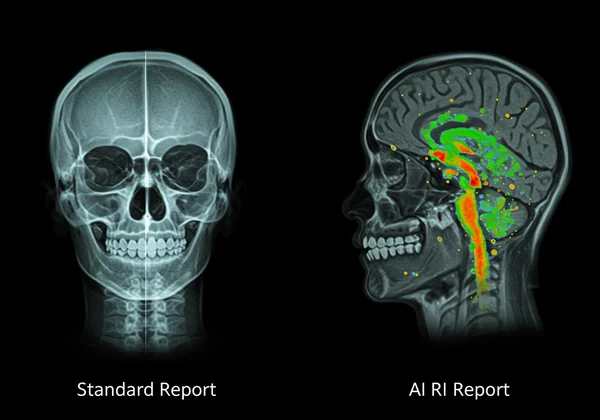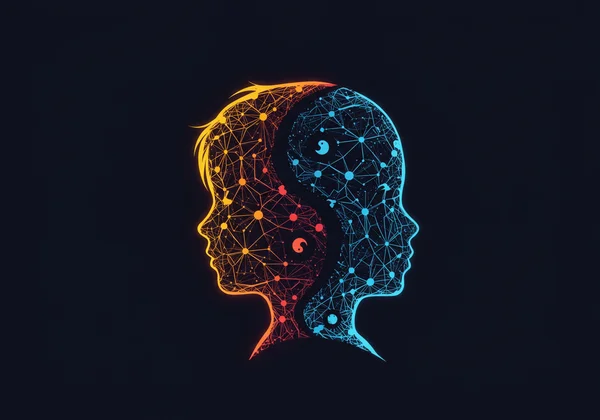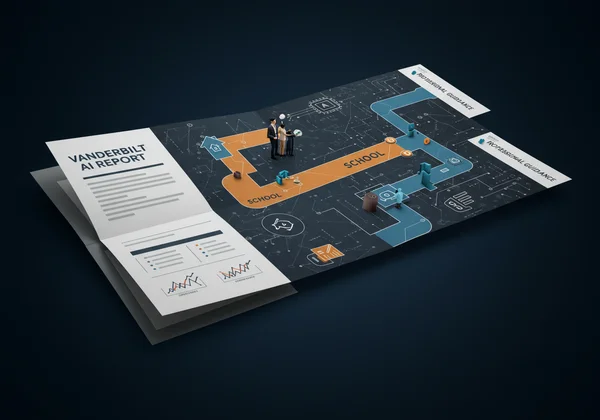Vanderbilt Assessment: Desbloquee información sobre el TDAH impulsada por IA
Como padre, maestro o profesional, usted entiende que un niño es más que solo un conjunto de números en un formulario. Si bien una Evaluación Vanderbilt estándar proporciona un primer paso crítico para comprender los comportamientos potenciales relacionados con el TDAH, sus puntajes a veces pueden generar más preguntas que respuestas. ¿Es usted un padre o educador que busca algo más que solo puntajes de una evaluación de TDAH? Imagine transformar esos puntajes en una narrativa rica y contextual que ofrezca información personalizada y pasos claros y accionables. Con nuestra herramienta en línea de Evaluación Vanderbilt, hemos cerrado esa brecha.
Descubra cómo nuestro exclusivo informe impulsado por IA va más allá del cribado tradicional para ofrecer información verdaderamente personalizada, guiándolo hacia una comprensión más clara de las necesidades únicas de su hijo. Esta herramienta avanzada lo equipa con un conocimiento más profundo, convirtiendo la confusión en claridad y la preocupación en acción confiada. Si está listo para ver el panorama completo, puede comenzar la evaluación en cualquier momento.

Más allá de los puntajes estándar: ¿Qué es nuestro informe IA de Vanderbilt?
La Escala de Evaluación Vanderbilt NICHQ estándar es una herramienta confiable y basada en evidencia para el cribado del TDAH. Señala eficazmente áreas potenciales de preocupación al puntuar síntomas de inatención, hiperactividad y condiciones relacionadas. Sin embargo, aquí es donde el viaje a menudo se detiene, dejándolo con datos pero no necesariamente con una historia. Nuestro informe IA de Vanderbilt retoma donde lo dejó el informe estándar, sirviendo como un potente motor de análisis construido sobre esa base confiable.
Piense en el informe estándar como una radiografía: le muestra la estructura. Nuestro informe IA es como una resonancia magnética, que proporciona una vista detallada y multidimensional de cómo funciona todo en conjunto. No cambia las preguntas ni la puntuación de NICHQ; enriquece los resultados analizando los patrones y los vínculos dentro de sus respuestas, junto con cualquier contexto adicional que usted proporcione. Este proceso convierte los datos brutos en un perfil dinámico y fácil de entender de su hijo.

Comprendiendo el análisis personalizado del TDAH
La verdadera personalización va más allá de simplemente enumerar los puntajes. Nuestro motor de IA realiza un sofisticado análisis comportamental al examinar la combinación única de respuestas en diferentes dominios. Por ejemplo, puede identificar conexiones sutiles entre los comportamientos de inatención de un niño en la escuela y sus síntomas de ansiedad en casa, un matiz que un simple puntaje numérico podría pasar por alto.
Este nivel de análisis considera los escenarios específicos que usted describe, creando un informe que refleja la realidad individual de su hijo. Va más allá de las descripciones genéricas del TDAH y proporciona información adaptada a * su * hijo. Esta tecnología ayuda a responder el crucial "por qué" detrás de los comportamientos, ofreciendo una comprensión más completa y empática de su experiencia. ¿Listo para ver cómo funciona? Puede probar nuestra herramienta gratuita hoy mismo .
Las limitaciones de la puntuación estándar por sí sola para una comprensión más profunda
Una hoja de puntajes estándar es un punto de partida invaluable, pero no puede proporcionar una visión holística de un niño. Dos niños pueden tener puntajes idénticos en la evaluación de TDAH de Vanderbilt y, sin embargo, enfrentar desafíos diarios muy diferentes. Uno podría tener dificultades principalmente con la regulación emocional, mientras que el problema principal de otro es completar tareas de varios pasos. La puntuación estándar por sí sola no captura este contexto crítico.
Esta limitación puede dejar a padres y educadores sentirse atascados, sin saber qué estrategias serán más efectivas. Sin una perspectiva más matizada, las intervenciones pueden parecer un intento de adivinación. Nuestro análisis impulsado por IA está diseñado específicamente para superar este obstáculo, proporcionando la comprensión detallada necesaria para crear estrategias de apoyo específicas y efectivas. Asegura que usted no solo esté mirando los síntomas, sino al niño en su totalidad.
Obtener información más profunda sobre los comportamientos y el TDAH de su hijo
El objetivo final de cualquier evaluación debe ser lograr una comprensión más profunda del TDAH y su impacto en la vida de un niño. Nuestro informe potenciado por IA está diseñado para ofrecer precisamente eso. Traduce los datos clínicos de la escala de Vanderbilt en una comprensión práctica y del mundo real que los padres, maestros y profesionales pueden usar de inmediato.
No se trata de etiquetar a un niño; se trata de iluminar su camino. Al comprender las formas específicas en que se manifiestan los rasgos relacionados con el TDAH, puede anticipar mejor los desafíos, aprovechar las fortalezas y crear un entorno en el que el niño pueda prosperar. El informe cierra la brecha entre la lista de verificación clínica y la experiencia vivida del niño, ofreciendo una perspectiva compasiva y completa.
Descubrir fortalezas y desafíos específicos con IA
Una de las características más poderosas de nuestro análisis de IA es su capacidad para proporcionar información equilibrada y basada en datos. Si bien identifica claramente los desafíos, también trabaja para descubrir las fortalezas potenciales de un niño. Por ejemplo, la misma impulsividad que puede causar interrupciones en clase también podría estar relacionada con la creatividad y el pensamiento fuera de lo común.
Nuestro informe IA destaca estas dualidades, ayudándole a ver a su hijo como algo más que una colección de déficits. Esta visión equilibrada es crucial para construir la autoestima de un niño y para desarrollar estrategias que aprovechen sus talentos naturales. Al comprender ambos lados de la moneda, puede fomentar una narrativa más positiva y alentadora en torno a su neurodiversidad y obtener resultados instantáneos que reflejen esta visión equilibrada.

Conectar patrones de comportamiento con la vida diaria y el funcionamiento
¿Qué significa realmente una puntuación de '3' en "está inquieto con frecuencia" para el día de su hijo? ¿Ocurre durante la tarea, en la mesa de la cena o al intentar conciliar el sueño? Nuestra IA toma las calificaciones abstractas y ayuda a conectarlas con escenarios concretos de la vida diaria basándose en los patrones que detecta, creando un perfil integral del niño.
Esta aplicación práctica hace que los resultados de la evaluación sean tangibles y relacionables, explicando cómo las dificultades para "mantener la atención" podrían traducirse en desafíos durante los deportes de equipo o problemas con la rutina a la hora de acostarse. Ayuda a los padres y maestros a identificar exactamente dónde se necesita más apoyo, lo que facilita la implementación de estrategias efectivas y relevantes durante todo el día. Puede usar el vanderbilt assessment parent form para comenzar a construir este perfil.
Cómo nuestro informe de evaluación personalizado proporciona asesoramiento práctico
La información sin una dirección clara puede ser abrumadora. Es por eso que nuestro informe de evaluación personalizado está estructurado para ofrecer orientación práctica y concreta. Creemos que una comprensión real de las necesidades de un niño debe ir acompañada de pasos claros que usted pueda tomar para apoyarlo. El informe está diseñado para ser una hoja de ruta, guiándolo desde la evaluación hasta la acción.
Ya sea que usted sea un padre que se pregunta qué hacer a continuación, un maestro que busca estrategias para el aula o un profesional que desarrolla un plan de tratamiento, nuestro asesoramiento generado por IA proporciona una base sólida y personalizada. Va más allá de las recomendaciones genéricas y ofrece sugerencias adaptadas a los patrones específicos identificados en los datos de la evaluación del niño.

Estrategias personalizadas para el hogar, la escuela y la discusión profesional
Cada niño navega por diferentes entornos, y el apoyo debe ser consistente en todos ellos. El informe de IA genera estrategias específicas diseñadas para su uso en el hogar, en el aula y como base para las discusiones con los profesionales de la salud.
Para el hogar, podría sugerir horarios visuales o técnicas específicas para gestionar las transiciones. Para la escuela, podría ofrecer ideas para adaptaciones en el aula o estrategias de comunicación para usar con el maestro. Para las discusiones profesionales, organiza los hallazgos clave en un formato claro y estructurado, lo que facilita compartir sus inquietudes y colaborar en un plan de apoyo integral. Puede completar el formulario para padres para recibir esta información personalizada.
Empoderar a padres y profesionales para los próximos pasos
El viaje de apoyar a un niño con sospecha de TDAH puede resultar aislado. Nuestra Evaluación Vanderbilt impulsada por IA está diseñada para ser un primer paso habilitador. Le proporciona un informe detallado de nivel profesional que valida sus inquietudes y le da la confianza para abogar por su hijo.
Armado con esta información, puede iniciar conversaciones más productivas con educadores y proveedores de atención médica. En lugar de simplemente decir "mi hijo tiene dificultades", puede presentar un plan de apoyo detallado basado en un análisis exhaustivo de sus comportamientos. Esto cambia la conversación de la incertidumbre a la resolución colaborativa de problemas, asegurando que su hijo reciba el apoyo que merece.
¿Listo para una comprensión más profunda? Transforme la experiencia de evaluación de su hijo hoy mismo
Navegar por las complejidades del comportamiento de un niño requiere más que solo puntajes; requiere comprensión, contexto y un camino claro a seguir. La Evaluación Vanderbilt tradicional es un excelente comienzo, pero nuestro exclusivo informe impulsado por IA lo lleva al siguiente nivel. Eleva una evaluación estándar a un viaje de descubrimiento personalizado, ofreciendo las perspectivas matizadas y la orientación clara que necesita para marcar una diferencia real.
No se conforme solo con números. Desbloquee una comprensión integral de las fortalezas y desafíos únicos de su hijo. Equípese con la claridad para apoyarlo de manera efectiva en el hogar, en la escuela y en colaboración con los profesionales. Comience su viaje en nuestra página de inicio hoy mismo y vea cómo la tecnología y la compasión pueden unirse para iluminar el camino a seguir. ¡Le invitamos a compartir sus pensamientos o preguntas en los comentarios a continuación!
Preguntas frecuentes sobre nuestro informe IA de Vanderbilt
¿Cómo se diferencia el informe IA de un informe de Evaluación Vanderbilt estándar?
Un informe estándar, basado en la vanderbilt adhd scale scoring guide, le proporciona puntajes numéricos que indican si los comportamientos de un niño cruzan un umbral para los síntomas clave del TDAH y las condiciones relacionadas. Nuestro informe impulsado por IA toma esos puntajes y los analiza en el contexto de todas sus respuestas, identificando patrones únicos, vínculos entre diferentes comportamientos y proporcionando una explicación narrativa. En resumen, el informe estándar le dice * cuáles * son los problemas potenciales, mientras que el informe IA explica * por qué * podrían estar ocurriendo y * cómo * puede ayudar.
¿Puede el informe IA de Vanderbilt diagnosticar el TDAH?
No, es fundamental comprender que esta herramienta no proporciona un diagnóstico médico. Nuestra plataforma en línea, incluido el informe IA, es una sofisticada herramienta de cribado del TDAH. Está diseñada para identificar y organizar patrones comportamentales para ayudarlo a tener una conversación más informada y productiva con un profesional de la salud calificado, como un pediatra, psicólogo o psiquiatra. Solo un profesional con licencia puede realizar una evaluación integral y proporcionar un diagnóstico formal.
¿Qué "información más profunda" específica proporciona el informe IA?
El informe proporciona un análisis de patrones que vincula comportamientos de diferentes secciones (por ejemplo, cómo la inatención puede relacionarse con la ansiedad), identifica fortalezas y desafíos para una visión equilibrada, y ofrece ejemplos basados en escenarios que ilustran cómo los puntajes abstractos se manifiestan en la vida diaria. También proporciona estrategias personalizadas para el hogar y la escuela y un resumen estructurado para facilitar las discusiones con los profesionales. Puede explorar la herramienta para ver una muestra de esta información.
¿Está el análisis personalizado impulsado por IA disponible para los formularios para padres y para maestros?
Sí, absolutamente. El análisis impulsado por IA está disponible tanto para el vanderbilt assessment parent form como para el vanderbilt assessment teacher form. El uso de ambos proporciona una invaluable visión de 360 grados del comportamiento de un niño, ya que permite a la IA comparar y contrastar patrones entre los entornos del hogar y la escuela. Este enfoque integral a menudo genera la información más matizada y útil, ayudando a crear un sistema de apoyo verdaderamente cohesivo para el niño. Incluso puede hacer que un maestro pruebe el formulario para maestros directamente desde nuestro sitio.